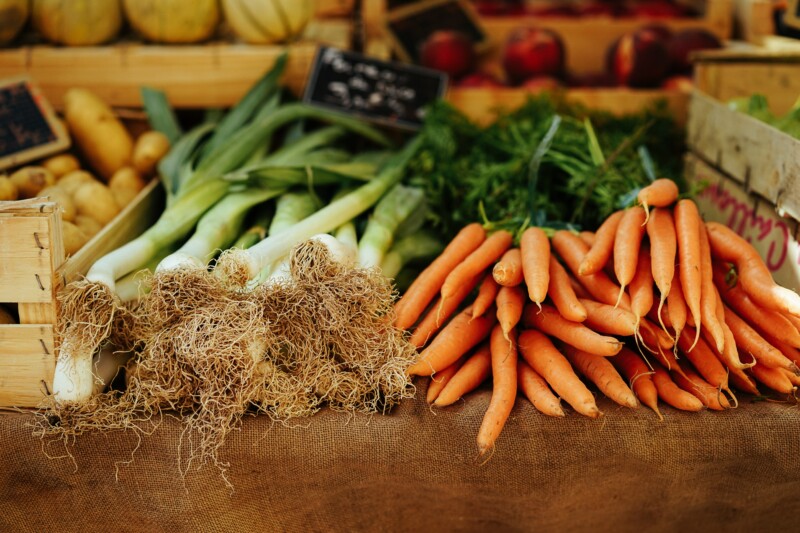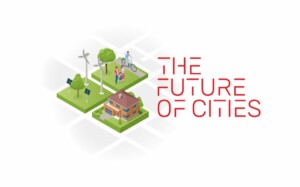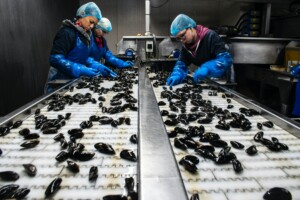The Future of Sustainable Food in Bristol

Share this
Food shortages have not been a problem for the UK since the Second World War.
Back then, we managed because the government stepped in and made sure we grew as much food as we could and bulk bought the rest from abroad. Since then it’s been left to the supermarkets and we’ve comfortably settled into only producing about half of what we eat and importing the rest. Our supermarkets have developed an incredibly advanced system that allows us to have new, delicious and plentiful foods, whenever we want.
But disruption from trade deals agreed after Brexit and changes in consumer demand following the first Covid-19 pandemic lockdowns revealed how this system is balanced on a knife edge. There are no stores of food that could see us through disruption like this, and our vulnerable supply chains are getting more vulnerable as the government plans to import food from further and further away.
That’s not to mention the increasing prices of food. Cheap food is often not good for our health but is important for our economy because cheap food means wages can stay low. But now, the cheap food that fuels a low-wage economy isn’t cheap enough anymore, with people in work having to rely on foodbanks.
The UK food system is in a bad state. We should all be able to afford healthy food that’s come through a supply chain where everyone involved can also comfortably afford it, and which is grown in ways that protect the environment, instead of destroying it.
Farmers are underpaid for their produce. The fees supermarkets are willing to pay them won’t cover the increased costs resulting from climate change and increases in fuel and feed costs. This means they struggle to invest in new and more eco-friendly ways of working. Despite this, the food they produce still isn’t cheap enough for low-wage workers to buy it.
This cost-of-living crisis isn’t the only thing to worry about. Climate collapse is coming, and the solutions to these crises will not come from our politicians. Unlike during the war, our current government is unlikely to intervene in the economy to protect our food supply. Cross-party ideological opposition to economic planning – for example the Conservative-Lib Dem coalition government scrapping a 2030 national food strategy shortly after the 2010 election – means we’ve missed opportunities to make the changes we need.
This is where cities can come in. Within our city we can have a big impact, without waiting for national policy to change. In the face of future food insecurity, cities offer an opportunity to build sustainable food systems that could protect large numbers of people, and also have an impact far beyond their boundaries.
Rising to the challenge
In 2021, Bristol became the first of two UK cities to achieve Gold Sustainable Food City status, in recognition of the city’s work to build a more sustainable, fairer and healthier food system that benefits people, communities and the planet.
And now, Bristol Food Network is working on a new plan to take this further – up to 2030. The Bristol Good Food 2030 Plan will set out what we can achieve as a city and steer us in the direction of a strong, more resilient food system.
In Bristol, businesses, charities and community groups collaborate with the council to make change through the ‘One City Approach’. This makes it easier for organisations to influence the decisions that have the biggest impacts on citizens’ daily lives. Following this approach, Bristol Food Network collates the priorities of businesses, public services and community organisations into one plan that we take to the council. We streamline the conversation, removing barriers and helping to find new ways forward when things seem too big to change. System change can’t happen one issue at a time – we have to look at the whole system.
Because of the scale of cities, we can make tangible changes to our local environment and have an impact on the wider economy. Food businesses and groups can reduce plastic waste, lower local emissions with electric vehicles and buy more local and sustainable products. If we get the biggest businesses and public bodies to invest in local produce, that’s a huge boost for local producers, and means they’ll be able to grow more food closer to home.
Bristol is one of the most engaged food cities in the UK. Our Gold Award Submission showed the massive amount of work being done across the city by businesses, charities and individuals. Lasting connections have formed between organisations which now work as an interconnected web, collaborating on strategies and plans which we hope will make a tangible improvement to our city’s environment.
Responding to a crisis
The response to the lockdowns showed how small community groups can step up. More agile than larger service providers, small community organisations did fantastic work protecting vulnerable people during those critical months. A small group might not be able to slow global climate change, but they can protect their communities by building infrastructure that can be relied upon in emergencies.
Some of the most impressive lockdown support projects were led by a handful of people working tirelessly to redistribute surplus to people who needed it most. People who had never done anything like that before took on huge responsibility. Neighbours stepped up to help people they’d never met. Businesses used the furlough scheme to enable their workers to volunteer to cook and distribute food.
Jamaica Street Stores collaborated with the People’s Republic of Stokes Croft to feed hearty meals to local citizens. Easton’s Thali Café made thousands of halal chicken curries which were distributed by National Food Service Bristol for months. It was wonderful to witness how, when we have the time and the money to do so, people are overjoyed to give their energy to helping others.
Sadly, many of these organisations have since closed or reduced their services. The two largest food delivery projects active during the lockdowns, Matthew Tree and National Food Service Bristol, both stopped delivering shortly after the lockdowns ended.
A lot of the food funding which poured into charities also dried up, and what has returned since is not enough to cover rising costs. Frontline services are struggling with rising demands and rising costs.
Thankfully, there are a few exceptions to this trend. During the lockdowns, Heart of BS13 worked with Square Food Foundation, which reached out to furloughed chefs to prepare meals, which were delivered to families known to the charity. These are both long-running, locally rooted organisations aiming to make a big impact in a small area, rather than spread thinly. They know their communities inside and out. In a crisis, this information is essential.
Since then, Heart of BS13 has joined five other organisations as one of Bristol’s first Community Climate Action Partners, meaning they’ve been granted thousands of pounds to invest in climate-conscious community development work. They’ll be composting and growing produce for their local area, and teaching people how to grow, cook and eat their own healthy, environmentally friendly food.
Increasing what we grow within the city could present a vital resource in an insecure future and building strong links between groups so they can work together is insurance against the next disaster. Successful projects like this offer real hope in a difficult time.
A vision for a sustainable food city
Unfortunately, we’re going to be in a much worse position the next time a crisis comes along. Voscur, Bristol’s support agency for the voluntary sector, predicts we are going to see ‘an utterly devastating reduction in services and projects available to communities in our city.’ This will make us less prepared for the next disaster. We need good information sharing and collaborative working so we can quickly identify the areas in greatest need and support the people working there.
It’s not an easy future for food, but Bristol is one of the best prepared places in the country to weather the coming storms. By investing in our community infrastructure now, we can protect vulnerable local people from the worst outcomes of climate change. Collaboration within cities presents the best opportunity we have to protect thousands of people.
The Bristol Good Food 2030 Plan sets out what we hope the city can achieve by the end of the decade, and our action plans describe what organisations across the city are already planning to do between now and the end of March 2024. This framework will forge more connections, helping make the most of available resources and working to have a positive impact on our food system.
If you want your organisation to make a difference in the city’s food system, it doesn’t matter how big or how small you are. You can bring your voice to essential conversations across the city. You can tell policy makers what your community needs to see change. It’s the job of Bristol Food Network to help you get your voice heard.
Bristol Food Network’s vision is to transform Bristol into a sustainable food city. And it’s our role to support, inform and connect individuals, community projects, organisations and businesses who share this vision.

Louise Delmege is a partnership coordinator for Bristol Food Network CIC, working on the Bristol Good Food 2030 Plan. She brings together businesses, charities and the council to collaborate on improving Bristol’s food system.
This article appears in Bristol 650: Essays on the Future of Bristol, a book bringing together essays from over 30 contributors, addressing some of the challenges the city faces and sharing ideas about how we might meet them. From dealing with the past, the future of social care, culture and housing to building a city of aspiration, the book looks to promote learning about the future of Bristol and encourage new ideas to come forward.
Free copies of Bristol 650: Essays on the Future of Bristol will be available at selected Festival of the Future City events in October 2023, or you can find articles featured in the book at bristolideas.co.uk/bristol650book.

